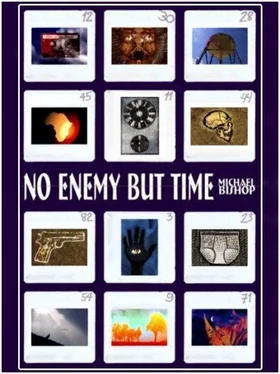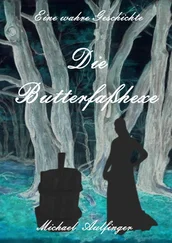Joshua did not want to end up even a slightly less dissipated version of R. K. Cofield. Nevertheless, the demands of self-sufficiency and the narrow compass of his marketable skills were channeling him, inexorably, in that very direction. Also to blame were pride and inertia. He could not get off center.
Yesterday, though, the pressure of his dreams and the threat implicit in Cofield’s vanquished eyes had set him zipping down Highway 98 to Pensacola.
* * *
On the greensward just beneath Joshua, Tom Hubbard was monitoring the operation of a sand pot and a yellow air compressor. A tall man whose eclectic tonsorial style included a William Powell mustache and jet-black Elvis Presley ducktails, he was shouting over the noise of the compressor and beckoning Joshua to descend. His arm movements were urgent, typically uncoordinated and brusque.
What the hell’s going on? Joshua wondered.
Then he saw the Air Force limousine parked at the curb behind the equipment truck, well within the restricted area where falling paint could lightly polka-dot its dark-blue finish. Near the snaky tangle of hoses lifting sand and fresh air to Cofield stood Alistair Patrick Blair and the colonel who had attended last night’s lecture with him. They were gawking at Joshua, their heads thrown back.
“Damn,” Joshua muttered. “The bastard came.”
He let go of the extension pole on his paint roller, which fell until the thong securing it to his seat caught it up and held it tick-tocking beneath him like a pendulum. The paleoanthropologist, clad today in a conventional business suit, smiled and waved.
“Get down here, Kampa!” Hubbard shouted after he had turned off the air compressor. “These gentlemen want to talk to you!”
Joshua maneuvered his ropes toward a fixed ladder on one of the tower’s colossal legs. It would have been easier to descend on his falls, but for reasons he could not quite articulate—to annoy Hubbard, to astonish Blair, to please himself—he wanted to make a spectacular dismount, even if it entailed a stupid as well as an illegal risk.
Undoing his safety harness, he swung clear of the falls. Then, gripping both hand rails, he pistoned backward down the ladder until he had reached one of the resilient support rods tying the legs of the tower together in a webwork of diamond-shaped diagonals. Here he leapt out, caught the support rod, and plummeted along it in a breathtaking glide. Sixty feet from the ground, at an intersection of diagonals, he reversed directions and came careering back toward the ladder.
“Goddamn it, Kampa!” shouted Hubbard. “Stop right there! Use the fuckin’ ladder! Whaddaya think you’re doin’?”
Joshua, like a paratrooper on a practice line, launched himself out along another support rod. Feet dangling, arms above his head, he rocked and swooped. He was so in control of his descent that he was able to enjoy the full range of expressions on the faces of the men below him. Then, about twenty feet up, he was back at the leg ladder again. Here he paused.
“You’re in violation of the Occupational Safety and Health Act,” Hubbard told Joshua, primarily for the others’ benefit. “Do that one more time, Kampa, and you’re gone. I’ll can your ass, I swear to God I will.”
Triumphant in his contemplation of Blair and the colonel, Joshua hitched a ride on another support rod.
About six feet from the ground, he released his grip and landed in a crouch directly under the tank. Even before he could straighten up, Hubbard was stalking circles around him, rebuking him for his carelessness and insubordination, telling him not to report for work on Monday. This was it, Joshua’s swan song, he was gone for good. Still in control, Joshua picked his way over the air and sand hoses to his visitors.
“If he’d cut his hand on a burr doing that,” Hubbard appealed to Blair and the colonel, tagging along, “his natural instinct would’ve been to let go of the rod. He’d be gone. My insurance rates are outrageous already, God knows. A dead man in my debit column sure as hell wouldn’t lower ’em none, either.”
The owner, president, and on-the-job foreman of Gulf Coast Coating, Inc., waved his hand about in exasperation, then turned the air compressor back on and sat down dejectedly on a stack of silicate-sand bags near the blast-cleaning machine.
Because of the noise Blair suggested that Joshua return with him and the colonel to Fort Walton Beach in the limousine. Joshua told the two men that he had transportation of his own. Besides, he wasn’t going anywhere with them until he had had a Coke with a double handful of crushed ice. His thirst was enormous.
As a consequence, Joshua and his visitors wound up in a corner booth at the Okaloosa Café, about a block and a half from the water tower. The only other customer in the place was a local policeman. A heavy-hipped waitress with a beehive hairdo and a dramatic streak of peroxide over one ear brought them their menus. Joshua felt that had not Blair and the colonel been with him, she would have used his paint-spattered boots and coveralls as an excuse to deny him service. Or maybe the fact that he was bleeding from his right palm.
“Are you all right?” Blair asked Joshua.
Exhilarated by the Great Man’s solicitude, Joshua said, “Sure. Sliced it on a burr skating that first rod, eighty feet up. Didn’t let go, though, did I? Just tipped my fingers over the bad spot and kept on comin’.”
Blair belatedly introduced the colonel, a full bird by the name of Crawford, the base commander at Eglin. He was a compact, round-faced man only slightly taller than Joshua, with a haircut that made him seem a refugee from Eisenhower’s 1950s. The light coming through the flyspecked front window of the Okaloosa Café glinted off his insignia and danced in his violet eyes.
“How did you find me?” Joshua asked.
“Telephoned the number on the slip of paper you gave Dr. Blair last night,” Colonel Crawford explained.
“Got the manager of your motor court, Mrs.—”
“Mrs. Gelb.”
“Right, Mrs. Gelb. She, in turn, told us where you were working, and we drove up here.”
Nodding meaningfully at the cut in Joshua’s palm, Blair put the message slip on the table and smoothed it out with his fingers. “The name, address, and telephone number are self-explanatory, young man, but, pray, what is the significance of this tiny black hand with the eye in the middle?”
“I kept a diary when I was small. I kept it in code. That was one of the symbols I used.”
Colonel Crawford asked, “What did it stand for?”
“ Homo habilis, I think.”
“ Homo habilis!” Blair exclaimed. “ Australopithecus habilis , you mean. The former was a term badly in need of overhaul even when you were a child. Nobody could ever quite agree which fossil specimens belonged in the category. As I tried to explain last night, habilis was decidedly more ape than man.”
“If the terminology’s screwed up,” Joshua said, “what better way to solve the problem than by a symbol? This hand with the eye in the middle means a certain kind of hominid, and only that kind.”
“But what criteria did you use to establish the category?”
“Observation.”
While Blair was trying to digest this claim, and perhaps to collate it with Joshua’s remarks about chalicotheres at last night’s lecture, Colonel Crawford asked, “What kind of diary was this, anyway?”
“A diary of my travels.”
The two men stared at Joshua.
“A dream diary,” he said in qualification. “When I was nine, my mother—my adoptive mother, I mean—suggested that I begin recording my dreams. So I did, in code. All my dreams were a kind of… well, I called it spirit-traveling. My spirit-traveling always took me to the same goddamn place. I’d had these special sorts of dream ever since I was a baby, but it wasn’t until I was seven or eight that I began to realize not only where I was going but when .”
Читать дальше



![Ally Carter - [Gallagher Girls 01] I'd Tell You I Love You But Then I'd Have to Kill You](/books/262179/ally-carter-gallagher-girls-01-i-d-tell-you-i-lo-thumb.webp)








